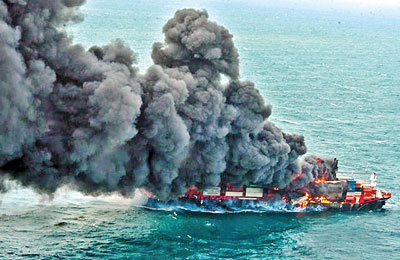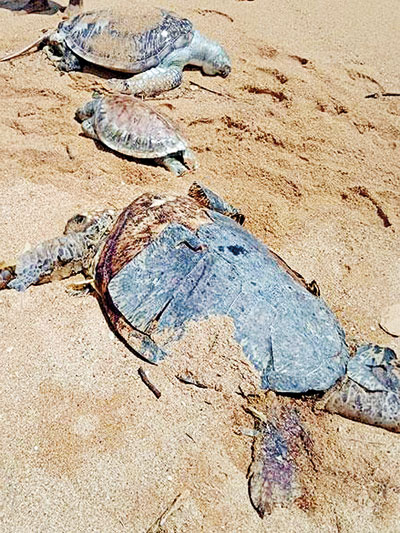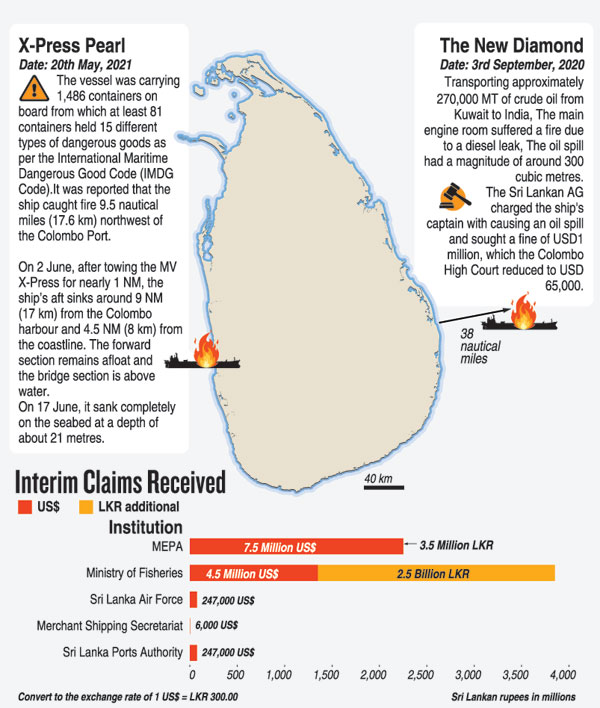News
Lanka lacks ability to prevent maritime disasters, reveals damning PSC report
View(s):- Inquiries into New Diamond and Xpress Pearl shipwrecks expose critical gaps in the country’s ability to manage maritime pollution incidents
- Delays in legal proceedings, inadequate coordination between government agencies exacerbated the environmental and economic damage
- Lack of clear protocols for engaging local communities in disaster response efforts, a major weakness
By Sandun Jayawardana
Investigations by the Parliamentary Select Committee (PSC) appointed to probe the disasters caused by the New Diamond and X-Press Pearl shipwrecks have revealed significant shortcomings in the existing legal and regulatory frameworks, as well as in the preparedness and response mechanisms of relevant authorities.
The PSC’s report, which was submitted to Parliament last month, prior to its dissolution, states that the X-Press Pearl disaster in particular, “exposed critical gaps in the country’s ability to prevent and manage maritime pollution incidents.” The Committee also found that delays in legal proceedings and inadequate coordination between government agencies had exacerbated the environmental and economic damage. Furthermore, the PSC states the lack of clear protocols for engaging local communities in disaster response efforts was identified as a major weakness.
The report notes that the two disasters have caused severe and long-lasting damage to Sri Lanka’s marine environment. The incidents led to extensive pollution, including oil spills and hazardous chemicals, which have impacted marine life, coastal ecosystems, and local communities dependent on these resources.
The response to both disasters was marked by delays and inadequacies, particularly in terms of immediate actions to mitigate the environmental impact. “The lack of preparedness and insufficient resources were noted as critical shortcomings in managing these crises,” states the report.
The report emphasises the need to hold the parties resoponsible accountable for the damage caused by these disasters. It also highlights the importance of ensuring adequate compensation for the environmental and economic losses suffered by Sri Lanka, including the livelihoods of affected communities.
There was a notable lack of public involvement and awareness in the processes related to disaster response and compensation, the PSC observes, calling for greater transparency and the inclusion of public opinion in future environmental and maritime governance.
The report suggests the need for
Sri Lanka to strengthen its position in international maritime law and disaster management, noting that the handling of the disasters involved significant international, legal and diplomatic challenges, particularly regarding the jurisdiction of legal proceedings and the enforcement of compensation claims.
Key recommendations made in the report include the establishment of a dedicated Ministry for the Ocean of Sri Lanka and the unification of maritime agencies under a single administrative framework to improve coordination during emergencies. The Committee has also pointed out the need to strengthen the legal frameworks, the advancement of oceanographic research, and the creation of a Coast Guard Maritime Agency within the Navy to strengthen maritime security. Strengthening regulations governing the transportation of hazardous materials, and enforcing strict compliance with international maritime safety standards are also among the recommendations. Regular inspections and audits of vessels carrying dangerous goods should be mandated, it adds.


Flashback to 2021: Black fumes from the burning Xpress Pearl and right,
carcasses of sea turtles that wahed ashore in the aftermath of the disaster
The Committee has also emphasised the need for all Sri Lankan agencies involved in ocean-related matters to establish and recognize a “Rapid Action Command Chain.” This Command Chain Center should be mandated to produce and submit quarterly reports on the activities and statuses of Sri Lanka’s maritime zones to Parliament.
Another recommendation is to implement an advanced vessel tracking and monitoring system that includes real-time data on the conditions of cargo, weather patterns, and ship movements. “This system would help in early detection of potential risks and allow for timely intervention,” the report opines.
With regard to the X-Press Pearl disaster, the Committee is of the view that if the Indian Port of Hazira had alerted Colombo Port regarding the nitric acid leak aboard the incoming vessel, the disaster could have been prevented.
Having suffered such a historical disaster, Sri Lanka should now look to introduce a Certificate of Departure (CoD) from the ports prior to the acceptance of vessels into its territorial waters and especially prior to entering any port in the country, the PSC recommends.
The Committee has also called for stricter penalties for ship operators and owners who fail to comply with safety regulations, and improved international collaboration to prevent future disasters.
The Select Committee calls on Parliament to act on its recommendations with urgency to safeguard the nation’s marine environment for future generations and to protect the livelihoods of those who depend on it.
The report has gone into extensive detail regarding the X-Press Pearl disaster, which had by far the larger impact. As per the estimate of the Marine Environment Protection Authority (MEPA), the total financial loss suffered by Sri Lanka has been estimated at nearly USD 6.4 billion.
The vessel, owned and operated by X-Press Feeders in Singapore, had 1486 containers onboard, 81 of which contained 15 different types of dangerous goods as per the International Maritime Dangerous Good Code (IMDG Code) when it departed the port of Hazira on May 15, 2021. This included 25 tonnes of nitric acid, other chemicals, cosmetics and 78 metric tonnes of plastic nurdles. It reached Colombo on the night of May 19, with a fire being reported to local authorities the following evening.
Plastic pollution and other debris from the wreck were found along approximately 300 km of Sri Lanka’s western, southern, and northern coastlines, transported by ocean currents. “The shoreline of Gampaha district was the most heavily impacted by plastic debris, with the pollution concentrated around a 5 km coastal stretch north of Colombo, with Sarakkuwa beach as its epicenter,” the report points out.
The report also remarks on the carcasses of sea turtles and other aquatic mammals that started washing ashore in the aftermath of the disaster, with the carcasses of 251 sea turtles and more than 45 other aquatic mammals washing ashore by July 17, 2021 according to the United Nations Environment Programme. Among the five sea turtle species recorded in Sri Lanka, four were confirmed to have washed ashore after the X-Press Pearl incident: Olive Ridley (Lepidochelys olivacea), Hawksbill (Eretmochelys imbricata), Leatherback (Dermochelys coriacea), and Green turtle (Chelonia mydas). The majority of deaths were of Olive Ridleys, the most common species in Sri Lankan waters. There were also suspected deaths of Loggerhead turtles (Caretta caretta).
The Committee has observed that the X-Press Pearl’s track intersected with Cyclone Tauktae, which was classified as a Category 4 cyclone. The ship moved away from the coast before travelling to Colombo, presumably to avoid the worst of the cyclone. However, the reports were that the cargo was moved around due to the inclement weather and this may well have contributed to the fire on-board, the report claims. Severe Cyclonic Storm Yaas followed in the Bay of Bengal originating on the 23rd of May and making landfall five days later. Its peak wind speeds reached 130-140 kmph. The long range impact of this cyclone on Sri Lankan seas would complicate fire-fighting efforts, states the report. “In retrospect, the X-Press Pearl ship’s management, harbour authorities and maritime agencies could have taken a variety of steps to avoid exposure, reduce the risks to the ship, the ocean and the littoral. In the face of extreme ocean weather risks, the X-Press Pearl has taken a route which led to high risk and a tragic disaster.”
Two cases have been filed regarding the disaster. The first is a criminal case against the captain of the ship and the Board of Directors of the local agent, “Sea Consortium Lanka” before the Colombo High Court under the Marine Pollution Prevention Act. The civil case concerning environmental claims meanwhile, has been filed in Singapore.
The New Diamond meanwhile, was transporting approximately 270,000 metric tonnes of crude oil from the port of Mina Al Ahmadi in Kuwait to Paradip Port in India, when it was hit by a fire on 3rd September 2020. The incident occurred due to a diesel leak in the main engine room, approximately 38 nautical miles off the east coast near Sangamankanda. According to MEPA, the oil spill from the wreck had a magnitude of around 300 cubic meters.

The environmental damage assessment considered four main factors: the impact on Sri Lanka’s fisheries and marine life, property damage, impact on tourism and other economic aspects, and miscellaneous costs.
The Attorney-General charged the ship’s captain with causing an oil spill and sought a fine of USD 1 million, which the Colombo High Court subsequently reduced to USD 65,000.
The PSC was chaired by Ramesh Pathirana and included Arundika Fernando, Suren Raghavan, G.L. Peiris Rauff Hakeem, Vijitha Herath, Sarath Weerasekera, Niroshan Perera, Ajith Mannapperuma, Nimal Lanza, Thushara Indunil Amarasena, Kavinda Heshan Jayawardena, Waruna Liyanage, Sanjeeva Edirimanna, Akila Ellawala, Nalaka Bandara Kottegoda, Kokila Gunawardena, Milan Jayathilake, Premnath C. Dolawatte, Thilak Rajapakshe, Madhura Withanage and Weerasumana Weerasinghe.
| Court orders release of X-Press Pearl captain’s passport for visa extension By Ranjith Padmasiri The court ordered the release of the passport of Captain Tyutkalo Vitaly as the visa allowing him to stay in the country had expired and he needed an extension. High Court Judge Sujeewa Nissanka, however, rejected a request by Arjuna Indrajith Hettiarachchi, the Chairman of Sea Consortium Lanka, which is the local agent of the container vessel, to release his passport to go overseas. Mr. Hettiarachchi is the 8th accused in the case filed by the Attorney General over the disaster. The request to release the passport came in the backdrop of the Supreme Court issuing an interim order preventing the Colombo High Court from proceeding with the case. Appearing for the AG, Deputy Solicitor General Madawa Tennakoon did not object to the release of the Russian captain’s passport but objected to the request made by Mr. Hettiarachchi’s lawyer, Chaminda Athukorala, to release his client’s passport to go abroad for medical treatment. | |
The best way to say that you found the home of your dreams is by finding it on Hitad.lk. We have listings for apartments for sale or rent in Sri Lanka, no matter what locale you're looking for! Whether you live in Colombo, Galle, Kandy, Matara, Jaffna and more - we've got them all!

